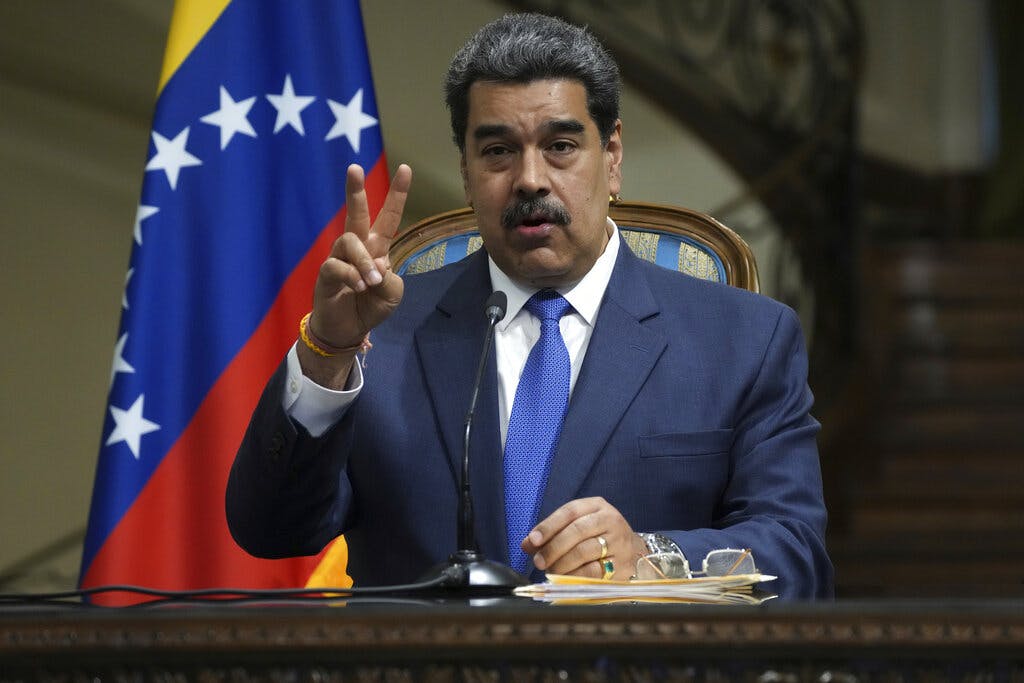Venezuelan Opposition Seeks Gains as Biden Pushes To Lift Sanctions
Free and fair elections is the main goal, but the Maduro regime is seen as having no incentive to move in that direction with the American president eager for more oil.

At least on paper, President Biden’s efforts to appease the oppressive Caracas regime by lifting American sanctions hinge on negotiations between President Maduro and members of the opposition that are scheduled to start this weekend at Mexico City.
No tangible results are expected to emerge from the Mexico City session, though, and even at this stage Mr. Maduro has some unannounced conditions. Mr. Biden seems eager to lift sanctions regardless, and the Caracas regime has little incentive to make room for the emergence of a viable Venezuelan opposition.
“Negotiations have been provisioned for months, yet the regime has resisted in an attempt to extract more concessions from the Biden administration,” the director of the Americas Program at the Center for Strategic and International Studies, Ryan Berg, told the Sun.
“The Government of the Bolivarian Republic of Venezuela and the Unitary Platform of Venezuela have decided to resume the dialogue and negotiation process,” the Norwegian Embassy to Mexico tweeted. According to Oslo, which has facilitated the talks, the parties are expected to “sign a partial agreement on social matters.”
Washington is proposing to permit the Chevron Corporation to resume operations in Venezuela and restart joint ventures with the government-owned monopoly, Petroleos of Venezuela, known as Pdvsa. Some American sanctions are already being lifted.
Earlier this year, Washington and Caracas completed a prisoner swap, as seven Americans were released in exchange for two of Mr. Maduro’s nephews, who were convicted in a New York federal court of drug trafficking. Talks to renew Chevron’s activity in Venezuela are already under way.
“It is expected that the technologies needed to resume operations will be installed in Venezuela in January or February,” a Venezuelan political consultant, Pablo Quintero, told the Sun. “The United States has more intentions to seal this deal than Venezuela because of the energy crisis” in America.
Some believe, however, that the removal of sanctions would be slow. Mr. Biden will “limit money going to the Maduro regime,” Mr. Berg said, adding that Washington would seek guarantees that the resumption of Chevron’s operations “repay an existing debt owed by Venezuela” to Chevron.
Earlier this year, Reuters reported that part of the Biden administration’s motivation to negotiate with Mr. Maduro was to gain payment of the debt from Pdvsa. The Venezuelan oil company owes America “hundreds of millions of dollars,” according to the report.
In June, the state department authorized an Italian oil company, Eni, and Spain’s Repson to resume operations in Venezuela to settle billions of dollars of unpaid debt owed by the regime, and to “contribute to European energy security” in the wake of Russia’s invasion of Ukraine, Mr. Berg said.
Three days ago, the head of the European Union’s delegation to Venezuela, Rafael Dochao of Spain, said that nearly $3 billion in Venezuelan funds frozen under sanctions imposed by America would be used to combat the humanitarian crisis in the country and boost public services.
On Thursday, Mr. Maduro’s chief negotiator, Jorge Rodriguez, the national assembly president, said that in Mexico the government will sign an agreement to address “vital social needs and public service problems, based on the recovery of legitimate resources.” He blamed the blocking of funds by “the international financial system” for the country’s upheaval. Mr. Maduro added that Caracas will “regain” the “kidnapped” resources.
The Venezuelan opposition’s main priority in the Mexico City talks is to determine the presidential elections for 2024, according to local media. Topping the opposition’s demands would be an announcement of a date for national elections. “Venezuela can’t wait,” a top opposition leader, Juan Guaido, said.
Under Mr. Maduro’s authoritarian rule, however, this weekend’s talks are unlikely to yield anything resembling free and fair elections, a Venezuelan-born associate at the Center for Strategic and International Studies, Alexandra Winkler, told the Sun. In order for that to happen, she says, the entire electoral system would have to change, including the National Electoral Council and the Supreme Court, which are under the influence of Mr. Maduro.
There is no incentive for Mr. Maduro to have meaningful negotiations with the opposition, Ms. Winkler said. Conversations with Mr. Biden are already occurring and sanctions are being lifted every month, she adds.

